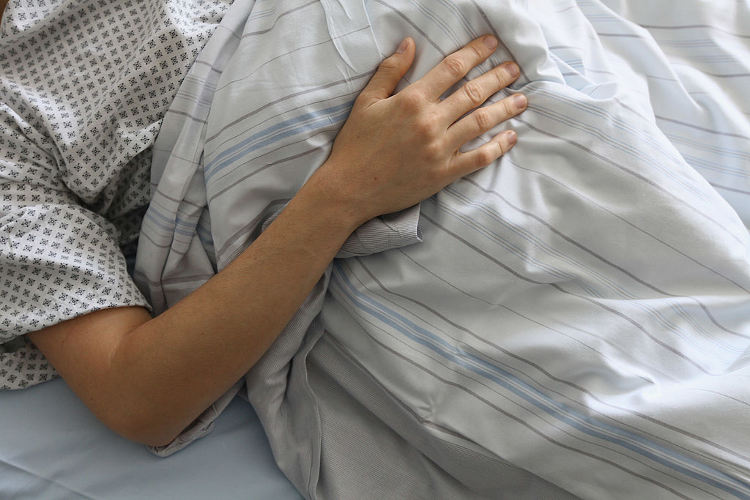
Credit: Sean Gallup / Staff / Getty
The kidneys are located in the lower-back region and help filter blood by extracting unwanted elements and waste, bundling it up in urine, and sending it off to the bladder for storage and eventual excretion. This is an understandably important process, which is why kidney failure can be so problematic or even life-threatening.
Simply put, kidney failure is when the organ’s filtration ability gets impeded and the kidneys can no longer perform their duty properly. It should never be a privilege to pee, so hopefully this guide can help offer some information on potential causes and signs of kidney failure to keep in mind for the future.
Symptoms of Kidney Failure
Kidney failure can be surprisingly subtle and produces symptoms that can get overlooked or mistaken for another, more common cause.
When the kidneys begin to fail, they stop producing urine at their normal levels. This results in you not needing to pee as much and, when you do, your output is noticeably lower than normal (though sometimes output will be sporadically normal anyway). Since your kidneys are not producing urine as well, all that extra fluid has to go somewhere. Gravity dictates that it travels downwards, so kidney failure can present with signs of fluid retention (edema): swelling in the legs, ankles, or feet. Specifically, kidney failure can result in pitting edema, which can be identified by applying pressure to the swollen area. If the skin remains “indented” for some time, it is an indicator that fluid buildup is the problem.
Other symptoms of kidney failure include unexplained shortness of breath (from fluid in the lungs) and excessive drowsiness or fatigue, as well as persistent nausea or fatigue.
The main dangers of kidney failure come from your body losing its ability to properly regulate its own chemistry. The human body relies on a careful balance of substances to function and the kidneys help maintain equilibrium. When certain elements of blood chemistry, like fluid and electrolyte levels, are thrown off by kidney failure, muscle weakness or damage can result. There is also a very real risk for other chemicals to build up to dangerous levels—excess potassium in particular is a common concern when dealing with kidney failure. In the worst-case scenarios, this imbalance can lead to irreversible kidney damage, seizures, coma, or death.
What Causes Kidney Failure?
Kidneys do not spontaneously fail like a Microsoft program. If you are experiencing kidney failure, then it means that one of three events have occurred:
- Blood flow to the kidneys has stopped or slowed
- You are experiencing a urinary obstruction and waste has built up
- You have suffered direct damage to the kidneys
Impaired Blood Flow
If the kidneys are deprived of blood, they can’t get oxygen and will begin to suffer damage or die. If blood flow is simply slowed instead of stopped, then damage can develop over time rather than suddenly. Possible causes of impaired blood flow include:
- Heart attack or coronary disease
- Liver failure or scarring
- Severe blood loss
- The use of blood thinners or blood pressure medication
- Certain infections
- Aspirin, ibuprofen, or similar drugs (this is why you shouldn’t exceed recommended dosages)
- Anaphylaxis from an allergic reaction
- Severe dehydration
- A severe burn
- Blood clots
- Cholesterol blockages
Urinary Impairment
If something is preventing you from peeing properly, waste will build up and overwhelm the kidneys. This is usually the result of something physically blocking the ureter or affecting the bladder, such as:
- Prostate, colon, cervical, or bladder cancers
- Enlarged prostate
- Kidney stones
- Blood clots
- Nerve damage to the bladder
Kidney Damage
This is basically the “miscellaneous” category as far as causes of kidney failure are concerned. There are a host of conditions, pathogens, and substances that can injure the kidneys severely enough to cause failure. This list includes:
- Physical trauma
- Kidney infections
- Autoimmune diseases
- Scleroderma (a group of rare connective tissue/skin diseases)
- Certain rare blood disorders (hemolytic uremic syndrome, etc.)
- Vasculitis (blood vessel inflammation)
- Cocaine use
- Heavy metal poisoning
- Alcohol abuse or alcohol poisoning
- Certain chemotherapy drugs or antibiotics
- The dye used in imaging tests
Kidney Failure Treatments
Kidney failure is treated by addressing the underlying cause, which means the exact treatment practices can vary wildly from intensive medication to surgical repair to watchful waiting. During treatment, your doctor will also take certain steps to help support the kidneys and reduce the risk of further complications:
- Fluid balance (diuretics if you have too much, IV infusion if you have too little)
- Medications to keep potassium levels under control
- Calcium infusions
- Dialysis, where toxins and waste products are mechanically filtered from the blood
If your kidney failure is chronic or the damage is permanent, then you may need to be on dialysis for the foreseeable future. If the kidney failure cannot be reversed, the only remaining option is for a new, healthy kidney to be transplanted. On the plus side, transplants mean you don’t need to continue getting dialysis. On the down side, it isn’t always easy to get a donor, the surgery itself has inherent risks, and transplant recipients have to take immunosuppressant drugs for the rest of their life and these can have serious side effects. Your doctor will be able to give a more detailed breakdown of the pros and cons of these options, should their consideration become necessary.